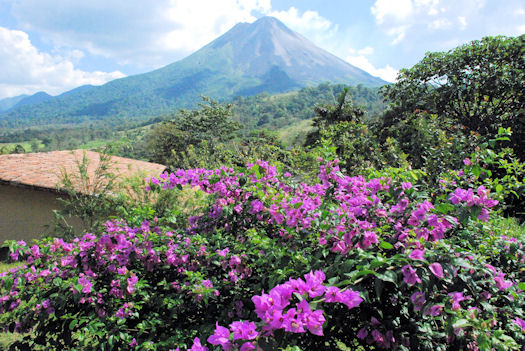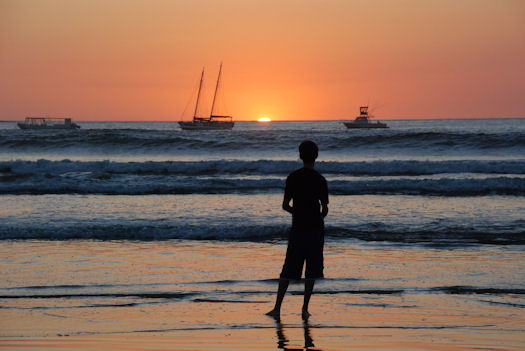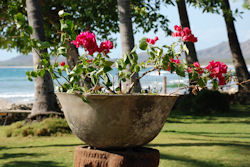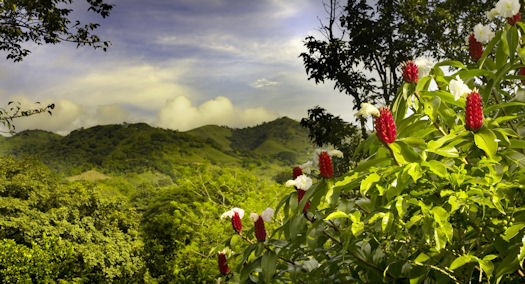Own a Piece of Paradise
As a safe, stable country with a thriving economy
Costa Rica is a shining star in Central America.
And with its tropical climate, sandy beaches, eco-friendly

lifestyle, and affordable real estate, Costa Rica
is an ideal place to buy a second home for vacation,
retirement or investment.
As
a foreigner, you may be wary of purchasing real
estate in a country other than your own, but as
you'll see, buying property in Costa Rica is not
a risky proposition.
In Costa Rica, non-residents have the exact same
rights to purchase and use real estate as citizens,
as guaranteed to individuals and corporations by
Costa Rica's constitution.
Put
simply, you don't need to be a citizen, or even
live in Costa Rica to own property in the country.
All that's required is a tourist-status visa, which
is good for three months at a time.
Costa Rica's Master-planned
Developments
Costa Rica is home to many exceptional master-planned
communities. These are "mini
cities" that offer the types of incredible
amenities that you'd typically find in world-class
resorts: Infinity pools, private beach clubs, on-site
shopping and dining as well as marinas and championship
golf courses, to name just a few.
Developers in Costa Rica know that foreigners buying
a second home in this country are seeking a certain
quality of life, complete with luxuries and services.
If there's lifestyle you've grown to love, there's
probably a Costa Rican community to match.

The Steps to Buying Property
in Costa Rica
The first step to buying real estate in Costa Rica
is to find a property that you like. Use a reputable
real estate agent who knows the market and can guide
you to the properties that are suited to your goals
- and steer you away from properties that are overpriced
or in less-desirable areas.
Your
agent will also monitor the purchase process and
ensure things go smoothly and as quickly as possible.
Very simply, here are the steps:
When
you buy real estate in Costa Rica the property's
title is transferred to you through the  execution
of a transfer deed, also known as an "escritura."
The deed is executed in front of a notary public.
execution
of a transfer deed, also known as an "escritura."
The deed is executed in front of a notary public.
After
the deed is accepted for registration, the Public
Registry will return the original document with
all the necessary stamps.
Much
of the transaction will be steered by a notary public.
Unlike in North America, where notaries are limited
to the authentication of signatures, a Costa Rican
notary must be a licensed attorney and is capable
of drafting and interpreting legal documents as
well as certifying their authenticity.
Closing
Costs
Generally,
in Costa Rica it is customary for the buyer and
the seller of property to equally divide the closing
costs. It is possible
to alter this custom in the purchase contract, and
the amount that the seller is willing to pay varies
from property to property.
Closing
costs include the fee for the notary and are based
on the actual sales price, not the appraised price
of prior sale price. You will be required to pay
1.5% of the first million Colones (Costa Rica's
currency) and 1.25% on any amount above that.

Also
keep in mind that you should anticipate paying the
land transfer tax, attorney and legal fees as well
as other fees that equal 2.56% of the declared property
value.
The
real estate tax is also charged at the time of property
sale and is based solely on the declared value of
the property.
Property
taxes in Costa Rica, also known as the municipal
tax, are quite low when compared to nations like
the United States and Canada. Factors that affect
the rate include the type of property, location,
size. etc.
Real
Estate Commissions Are Paid By Sellers
Much
like real estate transactions in the U.S., in Costa
Rica the owner or seller of the real estate typically
pays the commission to the real estate agents or
brokers at closing. That means, someone else will
eventually pay your agent for the hard  work he or
she puts toward finding you a suitable property.
work he or
she puts toward finding you a suitable property.
When
buying property from a developer, particularly in
the pre-construction stages, the price you pay is
the same regardless of whether you use a real estate
agent or buy directly from the developer. The real
estate commission is either given to the outside
agent or an in-house sales person. So choose to
work with the person whom you think will provide
you with the most objective information and best
service.
Ensuring
a Clean Title on Property in Costa Rica
To
ensure that a property has a clean title, you should
have an attorney perform a title search. This search
will reveal whether there are any liens or potential
ownership problems on the real estate you wish to
purchase.
The
Registro de la Propiedad (property registry) is
responsible for storing and recording all property
documents in Costa Rica. Located in San Jose - Zapote,
a title search here is the best place to get accurate
information regarding a title. If a title has been
altered in any way, a change must be filed at the
San Jose registry.
You
can also obtain a public registry report that gives
detailed property information such as the title
holder's name, boundary lines, appraisal for tax
purposes, lien information, mortgage information,
any recorded easements and other things that my
affect the title of a property in Costa Rica.
It's
always a wise idea to purchase title insurance.
It provides you with legal protection and recourse
should your title ever be brought into question.
No
Capital Gains Tax
An
incentive for foreign investment is Costa Rica's
lack of a capital gains tax. The government of Costa
Rica will not tax owners on any profit earned from
the sale of real estate or property provided that
it does not occur as a business transaction.

The
Appeal of Costa Rica
With
its rich history, natural wonders and laid-back,
friendly lifestyle, Costa Rica is becoming one of
the world's most popular locations for vacation
and retirement second homes.
If
you have more questions about purchasing property
in Costa Rica, don't hesitate to contact us. We
have the knowledge, the contacts and the experience
to answer all your questions and handle your real
estate needs.